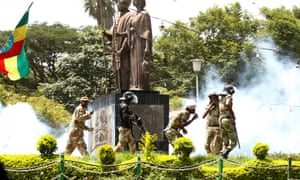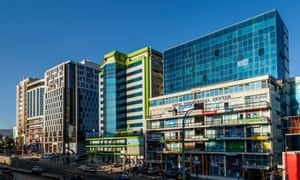Addis Ababa had a plan – to expand, and lead newly prosperous Ethiopia into a brave new century. But after protests led to a violent and harrowing state crackdown, what happens next could reverberate across Africa

Police fire tear gas to disperse protesters during Irreecha, the thanksgiving festival of the Oromo people in Bishoftu town of Oromia region, Ethiopia. Photograph: Tiksa Negeri/Reuters
By Jason Burke in Addis Ababa
Drive out of Addis Ababa’s new central business district, with its five-star hotels, banks and gleaming office blocks. Head south, along the traffic-choked avenues lined with new apartment blocks, cafes, cheap hotels and, in the neighbourhood where the European Union has its offices, several excellent restaurants. Go past a vast new church, the cement skeletons of several dozen unfinished housing developments, under a new highway and swing left round the vast construction site from which the new terminal for the Ethiopian capital’s main international airport is rising.
Here, the tarmac gives way to cobbles and grit and the city loosens its hold. Goats crop a parched field beside corrugated iron and breezeblock sheds, home to a shifting population of labourers and their families. Children in spotless uniforms neatly avoid fetid open drains as they walk home from school. Long-horned cattle wander. Beyond the airport, the road splits into a series of gravel tracks that quickly become dusty paths across fields, which take you to the village of Weregenu.
There is nothing remotely exceptional about Weregenu. It is just another cluster of flimsy homes like many others around, and within, Addis Ababa. Nor is there much exceptional about the series of demolitions here over recent months. As the Ethiopian capital expands, it needs housing, rubbish dumps, space for factories. All land is theoretically owned by the government, merely leased by tenants, and when the government says go, you have to go. So Weregenu’s thousand or so inhabitants know they are living on borrowed time. All have been warned that the bulldozers will come back.
“The police came with officials a few weeks ago. We had a day’s warning,” says Haile, a 19-year-old former resident. “Old people, children, pregnant women … It didn’t matter who you were or where you came from, your house was smashed to bits.”

Colourful buildings line the Bole Road, Addis Ababa, where the population is expected to boom to about 35 million. Photograph: Alamy
“No one told us why they wanted the land, except it is needed for development. We’ve been living there for years and years. I grew up there. Now we have to find somewhere else, or pay rent – and we can’t afford it.”
All over the developing world, there are people with similar stories. By 2050, according to the UN, over half of Africa’s population will live in cities, a much lower proportion than elsewhere in the world but twice as high as now. Ethiopia is one of the countries where urbanisation is moving fastest, and like elsewhere the process is placing massive strain on established political, economic and social systems. One result, as elsewhere, is violence.
The unrest in Ethiopia started in late 2015 with a small demonstration at a town where locals suspected officials of planning to build on a popular football pitch and a forest reserve. They rapidly intensified, prompting a brutal reaction from security forces. This prompted more protests and, inevitably, more brutality. By early autumn last year, several hundred people were dead and the unrest had become a full-blown political crisis.
Accounts of the violence are harrowing. Security forces have shot into crowds of unarmed schoolchildren, students and farmers. Footage of such incidents shows teenagers bleeding on the ground just metres from officials. Police have gone from house to house hunting suspected protesters, combed universities for activists who are then beaten with rifle butts or worse, and picked up any politicians suspected of dissent. Many detainees simply disappear. There is evidence of extra-judicial executions, while prisoners describe being kept for weeks in solitary confinement in dark cells, subjected to successive interrogations and beatings.
“I had no idea if it was day or night,” one prisoner, a musician held for weeks in prison in Addis Ababa last year, remembers. “I was interrogated for about two weeks, and punched or slapped. Then they tied my wrists together and hung me up by my arms from a hook. They hit my hands with sticks, breaking the bones. I passed out.”
To read full article click here
Source: TheGuardian


